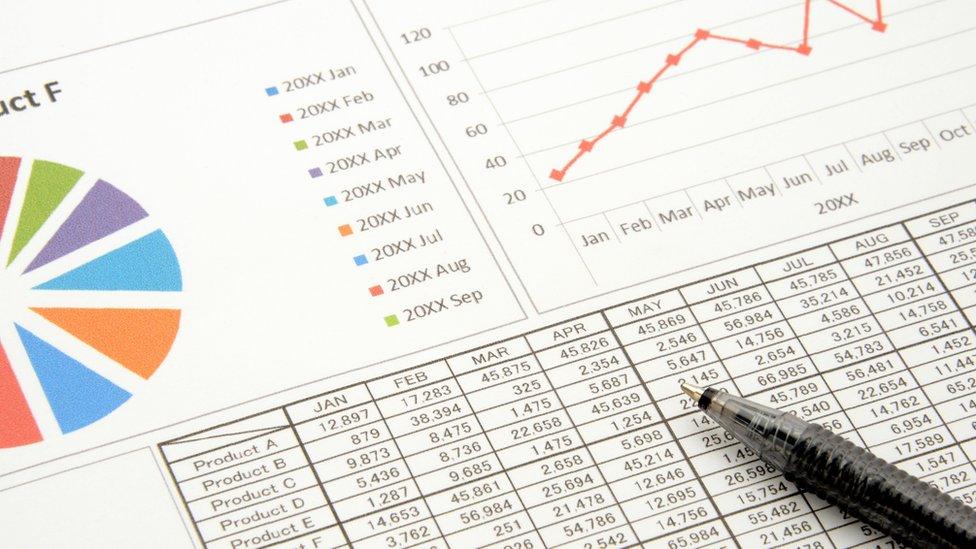Brakes on the spin cycle
- Published

Reform Scotland, the think tank, has warned that we've got problems with our numbers in Scotland.
It's not that they don't add up. It's that we don't have enough of them to be able to measure the economy properly. And those we have are, it is claimed, too easily "politicised".
Reform Scotland wants to see more detail, more comparison with other nations and regions of the UK and more clarity about variations within Scotland.
All that costs money, but their point is that policy ought to be based on evidence. The evidence ought to be trustworthy. So it ought to be a priority.
Economists have been saying something similar for a while.
Later this year, we expect to get the first economic forecasts from the Scottish Fiscal Commission, telling government how much income tax, and other levies, it can expect to collect. It does so with some fairly ropey data.
'Wilful distortion'
Their concerns chime with that extraordinary spat earlier this month between Foreign Secretary Boris Johnson and Britain's statistical chief.
Mr Johnson dragged the notorious £350m figure from the muddy Brexit campaign lake where other Leavers had hoped it had been fitted with concrete boots and drowned.
This, you'll recall, was the amount it was claimed goes from the UK to the EU each week.
Sir David Norgrove, chairman of the UK Statistics Authority, very publicly rebuked Mr Johnson for this dodgy claim. It ignores both the British rebate and all the spending by the EU on, for instance, farmers and scientific research.
This was, retorted the foreign secretary, a "wilful distortion" of the article he had written.
'Everyone's a winner'
That exchange, and the Reform Scotland commentary, reflect the growing prominence of concerns about the way in which statistics are used, particularly by politicians.
For the statisticians, it is increasingly important that they are independent and seen to be so.
Otherwise - as some have sought to do with the Government Expenditure and Revenue in Scotland (Gers) - the consensus behind the estimation, sampling and margins for error can be undermined and the numbers dragged into disrepute.
As Reform Scotland put it: "On Gers day, everyone's a winner."
The concern is sufficient for UK ministers to have lost a significant advantage in the handling of such data, and they're being denied it by their own statisticians.

Ministers and a select group of civil servants used to get advance notice of what was about to be published.
If, for instance, the labour market figures were due for publication on a Wednesday at 09:30, they would see them the previous afternoon, if not before.
They could have a close squint at what the figures said and get their story and defences prepared in advance.
Not any longer, though. Since the start of July, even the most senior ministers and civil servants are being told they have to wait until publication, just like the rest of us.
The National Statistician, John Pullinger, has ruled that "pre-release access" for UK ministers and civil servants has harmed public trust in official data, because of the way it was interpreted and the news was spun.
'Full compliance'
But that only applies to UK ministers. Not in Scotland. Scottish ministers continue to get access to sensitive data before the public - or their political opponents - do.
Figures collected by Scottish government statisticians are continuing to go to ministers up to five days before being released, allowing them to prepare for awkward news and to big up the good stuff.
So when the figures on Scotland's economic output are published, or the latest health service waiting times, or police numbers, or those annual Gers figures, ministers have had a chance to digest them first.
But they don't when the monthly job survey figures come out, as they are issued by the Office for National Statistics, based in Wales.
Asked about this, and if there are plans to align with the UK statisticians, a statement from a Scottish government spokesman said the handling of statistics is "in full compliance with the UK Statistics Authority's Code of Practice for Official Statistics".

However, in announcing the change at the Office for National Statistics, John Pullinger, who heads up the UK government's statists service, said it followed advice from that authority.
Replying to his announcement, Sir David Norgrove warmly welcomed it.
He wrote to Mr Pullinger on 15 June: "As you know, the UK Statistics Authority does not believe government ministers and officials should be provided with access to statistics before they are made available to Parliament and to members of the public.
"Equality of access to official statistics is a fundamental principle of statistical good practice, and the existence of pre-release access undermines trust in our official statistics system."
Fake news
The Royal Statistical Society (RSS) is also strongly in favour of ending pre-release access, citing higher levels of mistrust in public data in the UK than in other countries.
An RSS report on the issue, preceding the Whitehall announcement, stated: "Currently, ministers and key officials responsible for a policy area have access to statistical releases and publications in that area 24 hours before they are made available to Parliament or the general public.
"This is in direct contravention of the principle of equal access which is enshrined in international good practice.
"It also has implications for public confidence in statistics. The most recent (2016) report on Public Confidence in Official Statistics notes that 'the proportion [of the public] who felt that specific statistics are free from political interference ranged from just 46% for employment figures to 76% for the Census'."
The RSS noted: "A majority, 67%, in this survey supported official statistics being made available to everyone at the same time, with no pre-release access."
So, it may seem a small matter, which is usually only visible to journalists. But in the era of fake news, it's all the more important that the official numbers are trustworthy, they're seen to be so, and not skewed under ministerial pressure.
Statisticians have become very sensitive to questions of reliability and their independence.
However, this is an issue on which Scottish ministers, understandably, wish to stick to the old ways in Whitehall.
* It has been pointed out by the ONS that its ending of pre-release access has not been followed by Whitehall departments either. So figures collected and published by the Department of Work and Pensions or Home Office are not included in the change.
- Published26 September 2017
